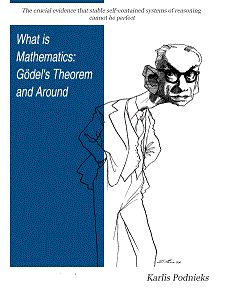
|
FreeComputerBooks.com
Links to Free Computer, Mathematics, Technical Books all over the World
|
|
- Title What is Mathematics: Godel's Theorem and Around
- Author(s) Karlis Podnieks
- Publisher: University of Latvia (2015); eBook (Creative Commons Licensed)
- License(s): CC BY-NC-SA 1.0
- Hardcover/Paperback N/A
- eBook PDF (259 pages, 1.41 MB)
- Language: English
- ISBN-10/ASIN: N/A
- ISBN-13: N/A
- Share This:

|
This book is an Hyper-textbook for students in mathematical logic and foundations of mathematics. Contents: Platonism, intuition and the nature of mathematics; Axiomatic Set Theory; First Order Arithmetic; Hilbert's Tenth Problem; Incompleteness Theorems; Around Goedel's Theorem.
This accessible book gives a new, detailed and elementary explanation of the Godel incompleteness theorems and presents the Chaitin results and their relation to the da Costa-Doria results, which are given in full, but with no technicalities.
Besides theory, the historical report and personal stories about the main character and on this book's writing process, make it appealing leisure reading for those interested in mathematics, logic, physics, philosophy and computer sciences.
About the Authors- Karlis Podnieks is a Professor and Faculty of Computing at University of Latvia.
- Mathematical Logic - Set Theory, Model Theory, Computability, etc
- General and Miscellaneous Mathematics
- Discrete Mathematics

- What is Mathematics: Godel's Theorem and Around (Karlis Podnieks)
- The Mirror Site (1) - PDF
- Book Homepage (PDF, Resource, etc.)
- Kurt Gödel and the Foundations of Mathematics: Horizons of Truth (Matthias Baaz, et al)
-
 Gödel Without (Too Many) Tears (Peter Smith)
Gödel Without (Too Many) Tears (Peter Smith)
How is this remarkable result of Gödel's Theorems established? This short book explains. The aim is to make the Theorems available, clearly and accessibly, even to those with a quite limited formal background.
-
 Incompleteness and Computability: Gödel's Theorems
Incompleteness and Computability: Gödel's Theorems
This book is an introduction to metamathematics and Gödel's Theorems. It covers recursive function theory, arithmetization of syntax, the first and second incompleteness theorem, models of arithmetic, second-order logic, and the lambda calculus.
-
 An Introduction to Gödel’s Theorems (Peter Smith)
An Introduction to Gödel’s Theorems (Peter Smith)
The formal explanations are interwoven with discussions of the wider significance of the two Gödel's Theorems. It will be of equal interest to mathematics students taking a first course in mathematical logic.
-
 Mathematics in the Age of the Turing Machine (Thomas C. Hales)
Mathematics in the Age of the Turing Machine (Thomas C. Hales)
Computers have rapidly become so pervasive in mathematics that future generations may look back to this day as a golden dawn. The article gives a survey of mathematical proofs that rely on computer calculations and formal proofs.
-
 The Limits of Mathematics (Gregory J. Chaitin)
The Limits of Mathematics (Gregory J. Chaitin)
A course on algorithmic information theory and the epistemology of mathematics and physics. It discusses Einstein and Goedel's views on the nature of mathematics in the light of information theory, and sustains the thesis that mathematics is quasi-empirical.
-
 Computability, Unsolvability, Randomness (Stephen G. Simpson)
Computability, Unsolvability, Randomness (Stephen G. Simpson)
The author exposits Turing's 1936 theory of computability and unsolvability, as subsequently developed by Kleene and Post. This theory is of the essence in theoretical computer science and in the study of unsolvable mathematical problems.
-
 Computability and Randomness (Andre Nies)
Computability and Randomness (Andre Nies)
The complexity and the randomness aspect of a set of natural numbers are closely related. This book includes a detailed treatment of Turing's theory of computability and unsolvability as subsequently developed by Kleene, Post, Friedberg, etc.
-
 Exploring Randomness (Gregory J. Chaitin)
Exploring Randomness (Gregory J. Chaitin)
This book presents the technical core of the theory of program-size complexity. LISP is used to present the key algorithms and to enable computer users to interact with the authors proofs and discover for themselves how they work.
-
 Computability Theory: Introduction to Recursion Theory
Computability Theory: Introduction to Recursion Theory
Computability Theory originated with the seminal work of Gödel, Church, Turing, Kleene and Post in the 1930s. These texts provide concise, comprehensive, and authoritative introduction to contemporary computability theory, techniques, and results.
-
 Introduction to Mathematical Philosophy (Bertrand Russell)
Introduction to Mathematical Philosophy (Bertrand Russell)
Requiring neither prior knowledge of mathematics nor aptitude for mathematical symbolism, the book serves as essential reading for anyone interested in the intersection of mathematics and logic and in the development of analytic philosophy.
-
 Introduction to Mathematical Logic (Vilnis Detlovs, et al)
Introduction to Mathematical Logic (Vilnis Detlovs, et al)
This book explores the principal topics of mathematical logic. It covers propositional logic, first-order logic, first-order number theory, axiomatic set theory, and the theory of computability. Discusses the major results of Gödel, Church, Kleene, Rosser, and Turing.
-
 A Friendly Introduction to Mathematical Logic (Chris Leary)
A Friendly Introduction to Mathematical Logic (Chris Leary)
In this user-friendly book, readers with no previous study in the field are introduced to the basics of model theory, proof theory, and computability theory, leading to rigorous proofs of Gödel's First and Second Incompleteness Theorems.





